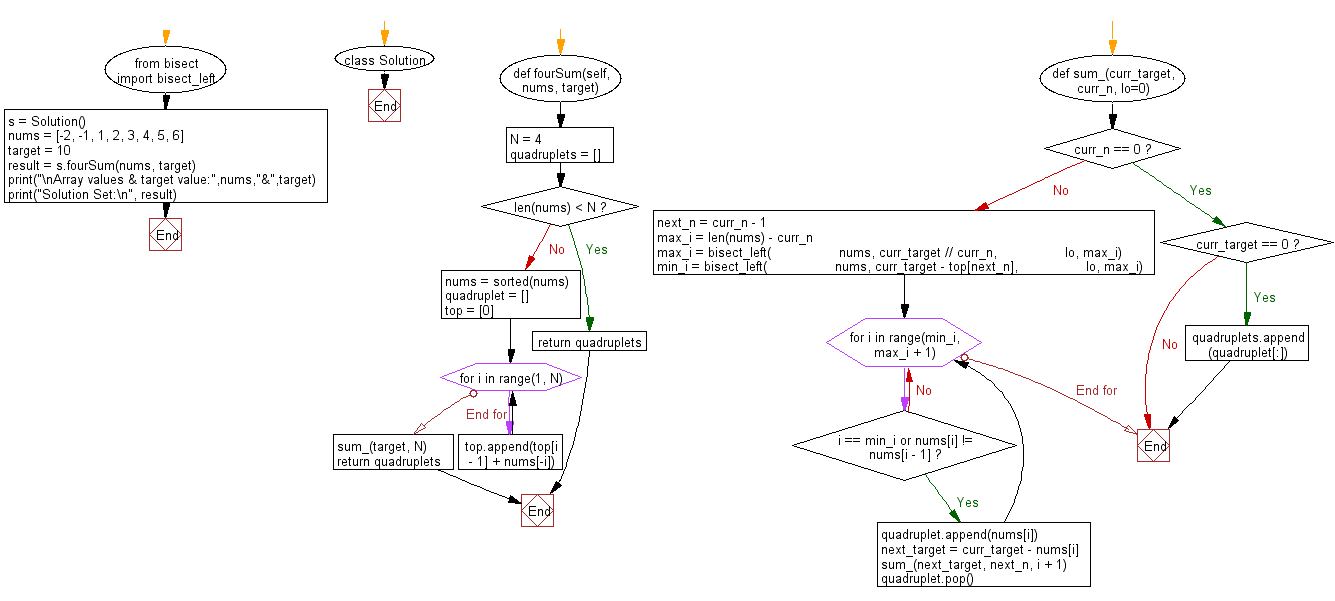Python Bisect: Find four elements from a given array of integers whose sum is equal to a given number
9. Quadruplet Sum Equals Target
Write a Python program to find four elements from a given array of integers whose sum is equal to a given number. The solution set must not contain duplicate quadruplets.
Sample Solution:
Python Code:
#Source: https://bit.ly/2SSoyhf
from bisect import bisect_left
class Solution:
def fourSum(self, nums, target):
"""
:type nums: List[int]
:type target: int
:rtype: List[List[int]]
"""
N = 4
quadruplets = []
if len(nums) < N:
return quadruplets
nums = sorted(nums)
quadruplet = []
# Let top[i] be the sum of largest i numbers.
top = [0]
for i in range(1, N):
top.append(top[i - 1] + nums[-i])
# Find range of the least number in curr_n (0,...,N)
# numbers that sum up to curr_target, then find range
# of 2nd least number and so on by recursion.
def sum_(curr_target, curr_n, lo=0):
if curr_n == 0:
if curr_target == 0:
quadruplets.append(quadruplet[:])
return
next_n = curr_n - 1
max_i = len(nums) - curr_n
max_i = bisect_left(
nums, curr_target // curr_n,
lo, max_i)
min_i = bisect_left(
nums, curr_target - top[next_n],
lo, max_i)
for i in range(min_i, max_i + 1):
if i == min_i or nums[i] != nums[i - 1]:
quadruplet.append(nums[i])
next_target = curr_target - nums[i]
sum_(next_target, next_n, i + 1)
quadruplet.pop()
sum_(target, N)
return quadruplets
s = Solution()
nums = [-2, -1, 1, 2, 3, 4, 5, 6]
target = 10
result = s.fourSum(nums, target)
print("\nArray values & target value:",nums,"&",target)
print("Solution Set:\n", result)
Sample Output:
Array values & target value: [-2, -1, 1, 2, 3, 4, 5, 6] & 10 Solution Set: [[-2, 1, 5, 6], [-2, 2, 4, 6], [-2, 3, 4, 5], [-1, 1, 4, 6], [-1, 2, 3, 6], [-1, 2, 4, 5], [1, 2, 3, 4]]
Flowchart:

For more Practice: Solve these Related Problems:
- Write a Python program to find all unique quadruplets in an array that sum up to a given target, using a combination of binary search and two-pointer techniques.
- Write a Python script to implement a function that returns a list of quadruplets whose sum equals the target, ensuring that no duplicate quadruplets are included.
- Write a Python program to search for four numbers in an array that add up to a specified target using bisect for optimizing inner loop searches.
- Write a Python function to output all valid quadruplets from a sorted list that sum to a target value, taking care to skip duplicate values during iteration.
Go to:
Next: Python Boolean Data Type Home.
Python Code Editor:
Contribute your code and comments through Disqus.
What is the difficulty level of this exercise?
Test your Programming skills with w3resource's quiz.
